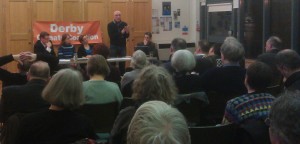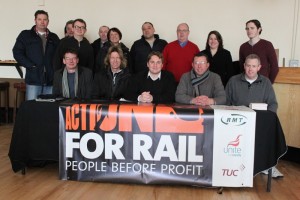All posts by Peter Robinson
Action for Rail
Energy We Can All Afford Meeting

We had an ENERGY WE CAN ALL AFFORD meeting in Derby last night, organised by Derby Climate Coalition, just one of a series of 40 public meetings: see www.energywecanallafford.org Continue reading Energy We Can All Afford Meeting
Story of our involvement in Bombardier
In June 2011 the news came through that the Canadian multinational Bombardier had not won the Thameslink contract. The implications for employment and Derby were horrendous, the direct loss of 1400 jobs in Derby, and many more indirectly in the region. This decision was made with no consideration given to the social & economic impact on the UK in awarding this contract overseas. The loss of the contract could have led to the shutdown of the last railway manufacturing plant in Britain, and one might argue that this has not happened because of the mighty fight back by members of the public and the unions.This case study explores how climate activists can work alongside trade unionists in what was at first appearance merely an ‘industrial’ dispute, about jobs. Continue reading Story of our involvement in Bombardier
Derby Telegraph Front Page
Protect Derby City Council’s climate change and energy management team
The Derby City Council’s climate change and energy management teams are under threat, once again. The Council is proposing to cut this part of the services by £110,000 over three years.
At a time when energy costs are soaring and severe weather events are impacting greatly on people’s lives, both here and around the world, for Derby City Council to even consider cutting these budgets, with the likelihood of staff losing their jobs, is bizarre. Continue reading Protect Derby City Council’s climate change and energy management team
Bombardier
This story explores how climate activists can work alongside trade unionists in what was at first appearance merely an ‘industrial’ dispute, about jobs.
In June 2011 the news came through that the Canadian multinational Bombardier had not won the Thameslink contract. The implications for employment and Derby were horrendous, the direct loss of 1400 jobs in Derby, and many more indirectly in the region. This decision was made with no consideration given to the social & economic impact on the UK in awarding this contract overseas. The loss of the contract could have led to the shutdown of the last railway manufacturing plant in Britain, and one might argue that this has not happened because of the mighty fight back by members of the public and the unions. Continue reading Bombardier
Report on the Bombardier rally; jointly organised by us
Here is a report on the bombardier rally , which was brilliant, in yesterday’s Derby Telegraph.
Derby million climate jobs meeting
speakers were good and it has generally registered on the local
political scene as another good meeting, one that has contributed to
building both the climate and the cuts movement in Derby.As we said before, we spent some time preparing for this, trying to
get unions to sponsor and support. In the event this was not reflected
in the turnout; there we very few trade union members there, but we
did make a few new contacts. I believe the Oxford meeting, held a week
before, attracted 56 or 57 people, and that also had very few trade
unionists. So be it. But that does not mean we shouldn’t be targeting
trade unionists; just that there is a big gap between them and the
environmentalists. Talking of the gap: we could only get a handful of
environmentalists down to a general anti-cuts protest, despite us
having a leaflet focusing upon the stringent cuts to the council’s
Climate Change unit. (Is anybody aware of similar offensives against
climate and environmental departments in other councils?)
Also, possibly, the TU movement is fairly inhibitated, except over
the anti cuts protests. The fact that we has good climate jobs meeting
meant that we were able to go to an anti-cuts organising meeting the
following evening and say that we had a good meeting, and asking the
anti-cuts folks to join our protest around the cuts to the climate
change unit (on Feb 15th). I suspect we will get more than a handful
of environmentalists to this, and hopefully quite a few trade
unionists as well.
‘Building the movement from below’ meeting in Leeds
The ‘building the movement from below’ meeting in Leeds yesterday was attended by 20 people, including people from Schumacher North &
Bradford, Sheffield Campaign against Climate Change, Derby Campaign
against Climate Change, Scarborough, Leeds Transition Town, Leeds
Christian Aid, Manchester Climate Camp, Leeds PCS, Kirklees, South
Lake District, Manchester Climate Action, Tidal Leeds and Hull
Greenpeace.
People in general said it was a very good meeting. For
example, Jane from Scarborough texted me and said she ‘enjoyed the
workshop very much and we are inspired to set up a Climate Alliance in
Scarborough’. Fiona Dear from Stop Climate Chaos said it made her see
thing differently and that there were ways other than the ‘top down’
approach adopted by SCC. Interestingly the Climate Connection events
last weekend inspired by SCC had been taken by a number of the
groups.
Given the range of attendees and experiences, and the emphasis upon
building from below, I was confident that the meeting would work. But
I wanted it to be more that than just about networking; that there
was a need to build local alliances which respected the spaces of
others, in particular offering a strategy for reaching to people who
are not coming from a green environmental background. I don’t think
all the people there agreed with that and the way I expressed it, but
there was a great deal in interest is seeing how we could connect with
the movement against the cuts.The other area of contention was around the suggestion that all local
groups alliances support the Zero Carbon 2030 agenda. Here my feeling
was that people got locked into specifics and weren’t aware of the
richness and flexibility of the general argument. The lesson is to use
the report as a way of seeing where we could go (the promised land),
to see what is possible, and to see what might have to give way in
order to go down that road. It would have been very useful to have
somebody explain the thinking behind Zero Carbon Britain in some
depth.One suggestion is that all networks and potential networks, and
potential alliance set up a Zero Carbon Britain meeting. (We did this
in Derby and attrated 95 people to our two meeting on that day). And
to do the same around a million climate jobs. It is important that
these be done in partnership with various organisations, in effect as
an alliance.In my haste to report the fundamentals of the Leeds meeting I never
mentioned the importance of the lobbies of MPs around the Big Climate
Connection, organised by Stop Climate Chaos. Many of the people at the
meeting had been involved in very successful grassroots lobbies the previous
weekend. It helped bring together activists who had been disconnected, for
example in Scarborough, but in other places as well. I am told that across
the country that many people said it helped rejuvenate their local groups.
For me this demonstrates the need to work on the inter-connections between
the local and the national, which was one of the themes of the Leeds
workshop. And to recognise the continuing importance of Stop Climate Chaos.
And to continue exploring how local networks and groups can be strengthened
and built and rebuilt.


